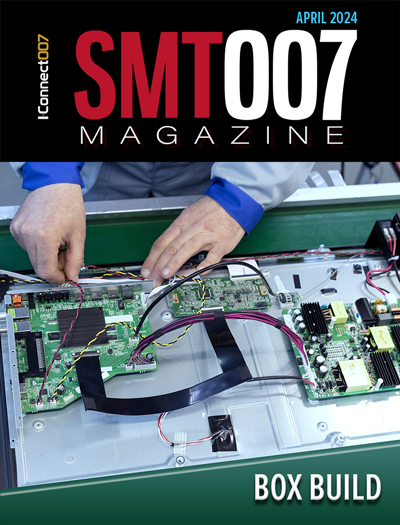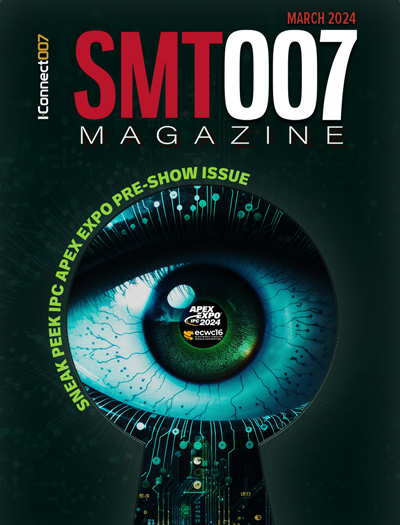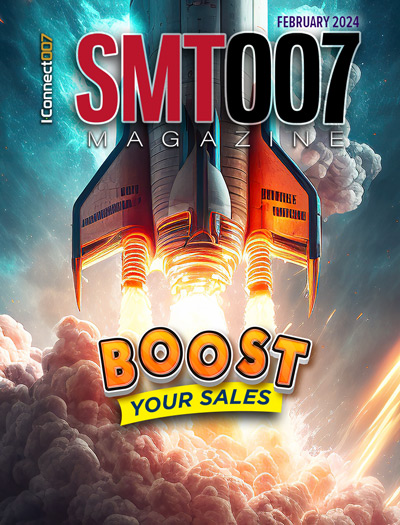-

- News
- Books
Featured Books
- smt007 Magazine
Latest Issues
Current Issue
Box Build
One trend is to add box build and final assembly to your product offering. In this issue, we explore the opportunities and risks of adding system assembly to your service portfolio.

IPC APEX EXPO 2024 Pre-show
This month’s issue devotes its pages to a comprehensive preview of the IPC APEX EXPO 2024 event. Whether your role is technical or business, if you're new-to-the-industry or seasoned veteran, you'll find value throughout this program.

Boost Your Sales
Every part of your business can be evaluated as a process, including your sales funnel. Optimizing your selling process requires a coordinated effort between marketing and sales. In this issue, industry experts in marketing and sales offer their best advice on how to boost your sales efforts.
- Articles
- Columns
Search Console
- Links
- Events
||| MENU - smt007 Magazine
Doing Business in India and China
March 31, 2015 | Barry Matties, I-Connect007Estimated reading time: 6 minutes
At CPCA 2015 in Shanghai, China, I spoke with Electrolube’s managing director, Ron Jakeman. The company, more than 70 years old, has evolved over the decades, from producing contact lubricants, to manufacturing globally, with subsidiaries worldwide, including Beijing, China. In this interview, manufacturing, state of the global markets, and even Indian cuisine are discussed.
Barry Matties: Tell us a little bit about Electrolube, Ron. What do you guys do?
Ron Jakeman: Well, we actually started back in 1941, believe it or not, with an electrical contact lubricant, which is obviously where the name came from. But over the years we've diversified into encapsulation resins, conformal coatings, thermal transfer pastes and cleaning products, and grown into a worldwide company with subsidiaries. The biggest one is actually here in Beijing, China, where we've got our manufacturing capability, together with a full R&D team and an international sales force. It's an amazing company, really. We’re still a family company, but run by an exact management team, which I lead.
Matties: Let's talk about India. What do you see?
Jakeman: Well, we got into India about three years ago. We were always there through distribution, but we owned the company in Bangalore with a warehouse in Mumbai where we stocked product locally, and that has transformed the business. The next stage is manufacturing in India, which we will be doing by this time next year.
Matties: They have all these visions of the India infrastructure improving and really becoming a strong competitor to China. You're there; what do you see?
Jakeman: There has been enormous change since Modi was elected. He did a great job bringing the future to that province. He removed all the bureaucracy, and made things happen. We're expecting him to continue as Prime Minister there, and already many initiatives are showing great benefits.
On the LED side, for example, they're offering a typically 300 rupee LED bulb to the consumer for 10 rupees, with the rest paid in installments on a customer’s electric bill. So that has fueled the growth of LED manufacture in India. And we have three products that fit beautifully, so we're obviously very happy. But what a great way to get LED to take off in the country. We could probably learn a lot from them in some areas.
But if you look at what's going on, it's a domestic market; it's not an export-led market like China. So in the longer term it's a bit more of a secure market. We've seen dips in the Chinese output and I think we'll see a few more over time. There are some issues developing; I think everybody's sort of accepting that and it's nice to be elsewhere when we need to be.
Matties: So you're based in the UK. You've covered China, India—the world, basically. But these are the three primary regions?
Jakeman: Yes, they are the three primary regions.
Matties: What is your take on market conditions? How are Europe, America, and Asia from your point of view?
Jakeman: We always get the most growth in Asia. But the European market, in spite of its problems, is doing very well for us, particularly in Germany. It's pretty slow in Australia, to be frank. They have problems there with the economy. But everywhere else is very buoyant. It’s just the currency that is giving us issues at the moment. You've probably seen the story of the euro and the dollar, and the pound sits in the middle. It can be challenging at times.
Matties: What markets are really driving the electronics area that you see?
Jakeman: We're having our most success in automotive, with coatings and thermal transfer products driving the growth.
Matties: The automotive industry seems to be really driving a lot of the new technology, now that it's basically a moving computer.Page 1 of 2
Suggested Items
KIC’s Miles Moreau to Present Profiling Basics and Best Practices at SMTA Wisconsin Chapter PCBA Profile Workshop
01/25/2024 | KICKIC, a renowned pioneer in thermal process and temperature measurement solutions for electronics manufacturing, announces that Miles Moreau, General Manager, will be a featured speaker at the SMTA Wisconsin Chapter In-Person PCBA Profile Workshop.
The Drive Toward UHDI and Substrates
09/20/2023 | I-Connect007 Editorial TeamPanasonic’s Darren Hitchcock spoke with the I-Connect007 Editorial Team on the complexities of moving toward ultra HDI manufacturing. As we learn in this conversation, the number of shifting constraints relative to traditional PCB fabrication is quite large and can sometimes conflict with each other.
Standard Of Excellence: The Products of the Future
09/19/2023 | Anaya Vardya -- Column: Standard of ExcellenceIn my last column, I discussed cutting-edge innovations in printed circuit board technology, focusing on innovative trends in ultra HDI, embedded passives and components, green PCBs, and advanced substrate materials. This month, I’m following up with the products these new PCB technologies are destined for. Why do we need all these new technologies?
Experience ViTrox's State-of-the-Art Offerings at SMTA Guadalajara 2023 Presented by Sales Channel Partner—SMTo Engineering
09/18/2023 | ViTroxViTrox, which aims to be the world’s most trusted technology company, is excited to announce that our trusted Sales Channel Partner (SCP) in Mexico, SMTo Engineering, S.A. de C.V., will be participating in SMTA Guadalajara Expo & Tech Forum. They will be exhibiting in Booth #911 from the 25th to the 26th of October 2023, at the Expo Guadalajara in Jalisco, Mexico.
Intel Unveils Industry-Leading Glass Substrates to Meet Demand for More Powerful Compute
09/18/2023 | IntelIntel announced one of the industry’s first glass substrates for next-generation advanced packaging, planned for the latter part of this decade.


